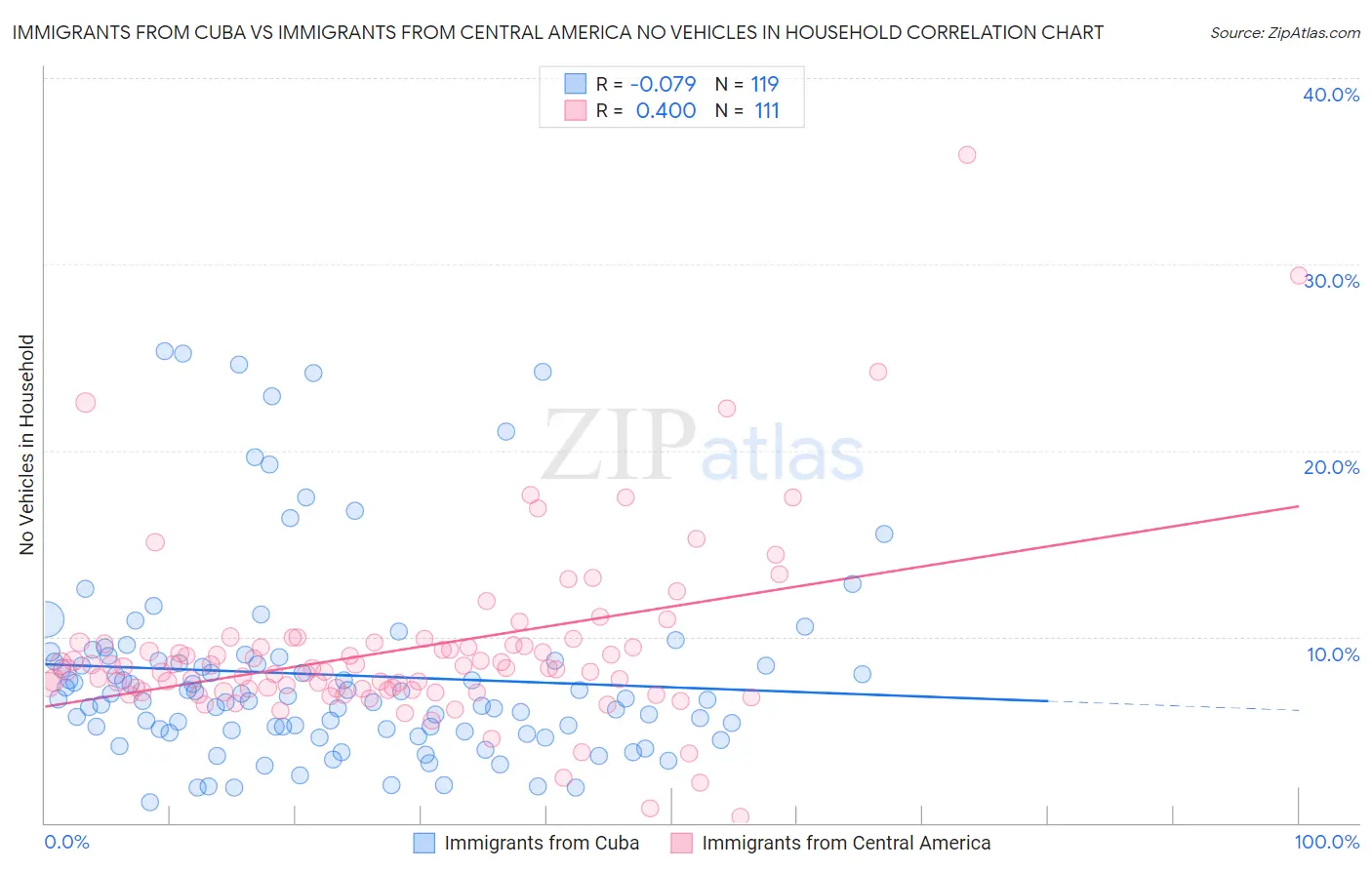Immigrants from Cuba vs Immigrants from Central America No Vehicles in Household
COMPARE
Immigrants from Cuba
Immigrants from Central America
No Vehicles in Household
No Vehicles in Household Comparison
Immigrants from Cuba
Immigrants from Central America
8.7%
NO VEHICLES IN HOUSEHOLD
99.2/ 100
METRIC RATING
89th/ 347
METRIC RANK
8.9%
NO VEHICLES IN HOUSEHOLD
98.5/ 100
METRIC RATING
97th/ 347
METRIC RANK
Immigrants from Cuba vs Immigrants from Central America No Vehicles in Household Correlation Chart
The statistical analysis conducted on geographies consisting of 325,235,999 people shows a slight negative correlation between the proportion of Immigrants from Cuba and percentage of households with no vehicle available in the United States with a correlation coefficient (R) of -0.079 and weighted average of 8.7%. Similarly, the statistical analysis conducted on geographies consisting of 533,101,389 people shows a moderate positive correlation between the proportion of Immigrants from Central America and percentage of households with no vehicle available in the United States with a correlation coefficient (R) of 0.400 and weighted average of 8.9%, a difference of 2.5%.

No Vehicles in Household Correlation Summary
| Measurement | Immigrants from Cuba | Immigrants from Central America |
| Minimum | 1.1% | 0.36% |
| Maximum | 25.3% | 35.8% |
| Range | 24.2% | 35.5% |
| Mean | 8.0% | 9.3% |
| Median | 6.6% | 8.3% |
| Interquartile 25% (IQ1) | 5.0% | 7.1% |
| Interquartile 75% (IQ3) | 8.7% | 9.6% |
| Interquartile Range (IQR) | 3.7% | 2.5% |
| Standard Deviation (Sample) | 5.3% | 4.9% |
| Standard Deviation (Population) | 5.3% | 4.9% |
Demographics Similar to Immigrants from Cuba and Immigrants from Central America by No Vehicles in Household
In terms of no vehicles in household, the demographic groups most similar to Immigrants from Cuba are Bhutanese (8.7%, a difference of 0.090%), Osage (8.7%, a difference of 0.14%), Immigrants from England (8.7%, a difference of 0.26%), Immigrants from Germany (8.7%, a difference of 0.28%), and Immigrants from Canada (8.7%, a difference of 0.30%). Similarly, the demographic groups most similar to Immigrants from Central America are Slavic (9.0%, a difference of 0.31%), Bulgarian (9.0%, a difference of 0.36%), Asian (9.0%, a difference of 0.55%), Pakistani (9.0%, a difference of 0.59%), and Yugoslavian (9.0%, a difference of 0.63%).
| Demographics | Rating | Rank | No Vehicles in Household |
| Italians | 99.4 /100 | #83 | Exceptional 8.6% |
| Immigrants | Jordan | 99.3 /100 | #84 | Exceptional 8.7% |
| Lebanese | 99.3 /100 | #85 | Exceptional 8.7% |
| Bangladeshis | 99.3 /100 | #86 | Exceptional 8.7% |
| Immigrants | England | 99.2 /100 | #87 | Exceptional 8.7% |
| Osage | 99.2 /100 | #88 | Exceptional 8.7% |
| Immigrants | Cuba | 99.2 /100 | #89 | Exceptional 8.7% |
| Bhutanese | 99.2 /100 | #90 | Exceptional 8.7% |
| Immigrants | Germany | 99.1 /100 | #91 | Exceptional 8.7% |
| Immigrants | Canada | 99.1 /100 | #92 | Exceptional 8.7% |
| Immigrants | North America | 99.1 /100 | #93 | Exceptional 8.7% |
| Austrians | 98.9 /100 | #94 | Exceptional 8.8% |
| Potawatomi | 98.8 /100 | #95 | Exceptional 8.8% |
| Immigrants | Bolivia | 98.7 /100 | #96 | Exceptional 8.9% |
| Immigrants | Central America | 98.5 /100 | #97 | Exceptional 8.9% |
| Slavs | 98.4 /100 | #98 | Exceptional 9.0% |
| Bulgarians | 98.4 /100 | #99 | Exceptional 9.0% |
| Asians | 98.3 /100 | #100 | Exceptional 9.0% |
| Pakistanis | 98.3 /100 | #101 | Exceptional 9.0% |
| Yugoslavians | 98.3 /100 | #102 | Exceptional 9.0% |
| Seminole | 98.3 /100 | #103 | Exceptional 9.0% |